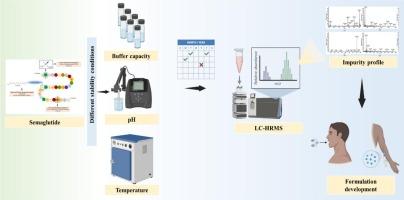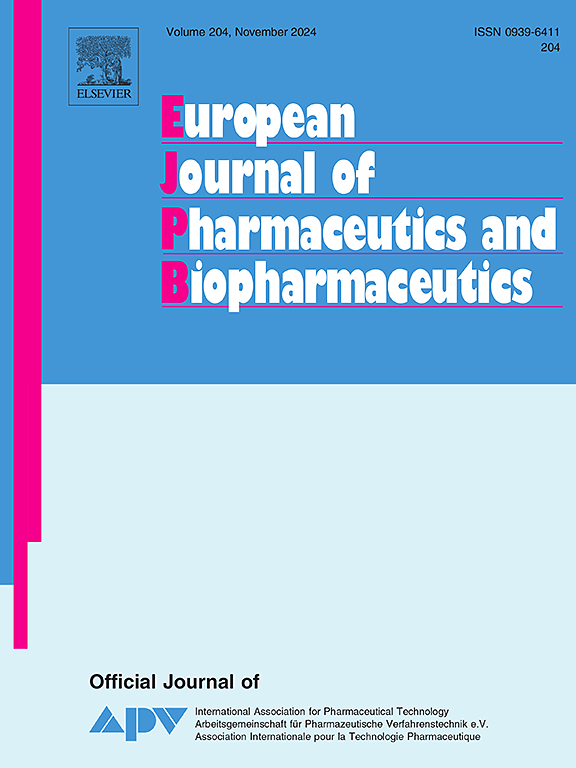Effect of pH, buffers, molarity, and temperature on solution state degradation of semaglutide using LC-HRMS: A preformulation protocol for peptide drug delivery
IF 4.3
2区 医学
Q1 PHARMACOLOGY & PHARMACY
European Journal of Pharmaceutics and Biopharmaceutics
Pub Date : 2025-06-07
DOI:10.1016/j.ejpb.2025.114780
引用次数: 0
Abstract
Semaglutide (SGL), a long-acting GLP-1 (Glucagon-like peptide) receptor agonist, is a 31-amino acid peptide modified with a C18 fatty diacid for albumin binding. Peptides are fragile and susceptible to degradation during formulation, storage, and transportation. The degradation of peptides resulted in the formation of impurities that may impact safety, efficacy, immunogenicity, and regulatory compliance. The present study examines the effects of pH, temperature, buffer species, and molarity on the stability of SGL. Reverse-phase ultra-performance liquid chromatography (RP-UPLC) was used to separate impurities, followed by liquid chromatography high-resolution mass spectrometry (LC-HRMS) for their molecular weight. The stress stability studies were conducted in thermal stress conditions at 25 °C, 40 °C, 60 °C (for 28 days), and 80 °C (for 7 days). The influence of pH, buffer strength, and buffer species on the degradation of SGL was investigated at 25 °C and 40 °C. The degradation of SGL resulted in thirteen known impurities, and their fragments were identified using LC-MS analysis. Six impurities, such as impurity 4 (m/z = 2717.21), impurity 5 (m/z = 4129.64), impurity 7 (m/z = 3762.28), impurity 8 (m/z = 3456.94), impurity 12 (m/z = 2967.5), and impurity 13 (m/z = 839), were formed across all the testing conditions. These impurities were relatively stable when compared to other formed impurities. The influence of pH on the thermal stability of SGL was demonstrated. The impurities, such as impurity 2 (m/z = 845.13), impurity 9 (m/z = 3397.76), impurity 10 (m/z = 701.0), and impurity 11 (m/z = 4125.7), were absent across all pH conditions, but these impurities were found when water was used as a solvent. The study demonstrated that the pH was a key factor for the thermal degradation of SGL. The degradation pathways were elucidated based on the mass data for known masses. The solution-state thermal stress studies were performed to select the buffer for formulating long-acting PLGA formulations. Moreover, the solution state stress stability data could be helpful for optimization of the pharmaceutical process, in vivo stability of SGL in muscles, storage and transportation of finished products, and determining the shelf-life.

pH、缓冲液、摩尔浓度和温度对用LC-HRMS降解西马鲁肽溶液状态的影响:肽药物递送的预配制方案
Semaglutide (SGL)是一种长效GLP-1(胰高血糖素样肽)受体激动剂,是一种由C18脂肪酸修饰的31个氨基酸肽,用于与白蛋白结合。多肽是脆弱的,在配方、储存和运输过程中容易降解。肽的降解导致杂质的形成,可能影响安全性、有效性、免疫原性和法规遵从性。本研究考察了pH、温度、缓冲液种类和摩尔浓度对SGL稳定性的影响。采用反相超高效液相色谱法(RP-UPLC)分离杂质,采用液相色谱-高分辨率质谱法(LC-HRMS)测定杂质分子量。应力稳定性研究在25°C、40°C、60°C(28天)和80°C(7天)的热应力条件下进行。在25°C和40°C条件下,考察了pH、缓冲液强度和缓冲液种类对SGL降解的影响。SGL的降解产生了13种已知的杂质,并使用LC-MS分析鉴定了它们的片段。杂质4 (m/z = 2717.21)、杂质5 (m/z = 4129.64)、杂质7 (m/z = 3762.28)、杂质8 (m/z = 3456.94)、杂质12 (m/z = 2967.5)和杂质13 (m/z = 839) 6个杂质在所有测试条件下形成。与其他形成的杂质相比,这些杂质相对稳定。研究了pH值对SGL热稳定性的影响。杂质,如杂质2 (m/z = 845.13)、杂质9 (m/z = 3397.76)、杂质10 (m/z = 701.0)和杂质11 (m/z = 4125.7),在所有pH条件下都不存在,但当水作为溶剂时发现了这些杂质。研究表明,pH是影响SGL热降解的关键因素。根据已知质量的质量数据,阐明了降解途径。进行溶液状态热应力研究,以选择用于配制长效PLGA配方的缓冲液。此外,溶液状态应力稳定性数据可用于优化制药工艺、肌肉中SGL的体内稳定性、成品的储存和运输以及确定保质期。
本文章由计算机程序翻译,如有差异,请以英文原文为准。
求助全文
约1分钟内获得全文
求助全文
来源期刊
CiteScore
8.80
自引率
4.10%
发文量
211
审稿时长
36 days
期刊介绍:
The European Journal of Pharmaceutics and Biopharmaceutics provides a medium for the publication of novel, innovative and hypothesis-driven research from the areas of Pharmaceutics and Biopharmaceutics.
Topics covered include for example:
Design and development of drug delivery systems for pharmaceuticals and biopharmaceuticals (small molecules, proteins, nucleic acids)
Aspects of manufacturing process design
Biomedical aspects of drug product design
Strategies and formulations for controlled drug transport across biological barriers
Physicochemical aspects of drug product development
Novel excipients for drug product design
Drug delivery and controlled release systems for systemic and local applications
Nanomaterials for therapeutic and diagnostic purposes
Advanced therapy medicinal products
Medical devices supporting a distinct pharmacological effect.

 求助内容:
求助内容: 应助结果提醒方式:
应助结果提醒方式:


